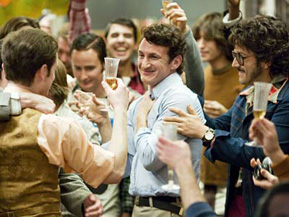|
|
Movie Review: MilkBy Matthew HuntleyDecember 8, 2008
After encountering prejudice, Milk strives to make a difference in the way gay people are treated. He walks out into the neighborhood with a blow horn and declares his candidacy for city supervisor. Many are surprised and few expect a homosexual man to win a public election, but Milk gains momentum and popularity, and not just from gay men and lesbians, but also from straight people and business owners who realize having the gay community on their side can be beneficial. After two failed attempts, Milk is finally elected to the San Francisco Board of Supervisors in 1977. His greatest victory would be a city ordinance that prevents people from being fired from their jobs on the basis of sexual orientation. Milk also combated Anita Bryant, the conservative Southern Baptist who upheld her strong anti-gay views and successfully repealed a local ordinance in Florida that prohibited discrimination on the basis of sexual orientation (it was later overturned in 1998). Milk, ostentatious yet calm, used Bryant's outspoken anti-gay remarks as excuses for boycotts and marches against homophobia. In fact, he would tell masses that Anita Bryant helped unify the people of San Francisco. His famous line, "I'm Harvey Milk, and I'm here to recruit you," became associated with taking action against injustice. We witness Milk never being too afraid to speak up, even upon receiving death threats. He'd stick such notes to his refrigerator as a reminder that he was making people notice what he was doing.
|

|
|
|

|
Friday, November 1, 2024
© 2024 Box Office Prophets, a division of One Of Us, Inc.


